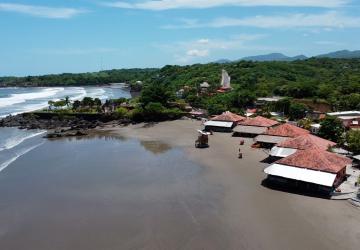Reinvigorated Resident Coordinator System Boosts Efficiency and Delivers Results for People and Planet

Six years after a major repositioning, the Resident Coordinator (RC) system is proving its value. A new report confirms that these reforms are successfully making the UN's development work more coordinated, efficient and responsive to the specific needs of countries, providing crucial stability and tailored support.
The findings, detailed in the annual report of the UN Deputy Secretary-General Amina Mohammed, in her capacity as Chair of the UN Sustainable Development Group (UNSDG), are being presented to Member States during the ECOSOC Segment on Operational Activities for Development (20-22 May 2025). The 2024 data underscores how Resident Coordinators are effectively steering UN teams and forging partnerships on the ground to deliver tangible results. This impact coincides with the Secretary-General's UN80 initiative, which he launched to harness “a significant opportunity to strengthen the UN system and deliver for those who depend on us.”
The Deputy Secretary-General echoes the perspectives of the UN chief saying, “The Resident Coordinator system remains our most efficient investment to support the sustainable development of countries at scale.”
“My annual report tells the story of a UN development system constantly in motion—resilient, adaptive, ambitious—and firmly anchored in country needs” she stressed.
For his part, the UN Assistant Secretary-General for Development Coordination agrees on the clear impact of the work of the RC system: “The dedication of Resident Coordinators and their teams in leading coherent UN action and enhancing operational efficiencies is vital for delivering tangible progress on development.”
Key Highlights from the 2024 Report:
The report provides compelling evidence of the RC system's impact, based significantly on feedback the Department of Economic and Social Affairs (DESA) gathered from host governments and UN entities in 2024¹:
- Alignment with National Priorities: An overwhelming 98 per cent of host Governments agreed that UN activities, guided by the UN Sustainable Development Cooperation Frameworks, closely matched their country's specific development needs and priorities. For instance, Rwanda’s 2025–2029 Cooperation Framework applies an integrated approach to sustainable development, integrating job creation and economic growth with natural resource management and environmental resilience. For Namibia, a similar Framework defines the UN’s value proposition across the four key areas of governance, economic transformation, green growth and human development, leveraging technical support and policy expertise for SDG acceleration.
- Enhancing Policy Impact: RCs led UNCTs to design and implement programmes strongly aligned with national goals while joint initiatives they shepherd are sparking policy reforms. For example, in Panama, UN collaboration led to “Law 431” establishing a National Care System and in Zambia, a coordinated effort by UNDP, UNESCO and UNICEF brought together Government, private sector, and civil society partners for enhanced digital infrastructure.
- Fostering System’s Transformation: The Joint SDG Fund enabled Resident Coordinators to spearhead collaborative UN action to transform national systems in 2024, impacting multiple SDGs at a time. RCs launched 136 new joint programmes across 90 countries, driving over 230 policy reforms, reaching more than 27 million people and unlocking over $250 million in future SDG financing. For instance, in Bolivia, the UNCT is implementing a programme to improve agriculture for vulnerable farmers by enhancing agrobiodiversity, preventing malnutrition, recovering ancestral knowledge, aligning supply with demand, and exploring new markets. In Ethiopia the UN team is connecting smallholders with climate-smart agribusiness opportunities.
- Facilitating Operational Efficiencies: The RC system is central to making the UN work more efficiently. This includes facilitating common premises, promoting shared back offices, and tracking implementation of Business Operations Strategies.
- Effective Coordination in Complex Settings: The report confirms improved UN teamwork across development, humanitarian, and peacebuilding efforts, particularly in challenging contexts (87 per cent agreement from Governments and UNCTs), leading to more unified response that keeps development at the center.
These findings show the reinvigorated UN development system is more strategically aligned, collaborative and effective under the leadership of Resident Coordinators.
As the Secretary-General's representatives on the ground, they are at the heart of this strategic transformation, poised to scale up these UN development system results to ensure the Organization’s continued relevance and effectiveness in meeting 21st century challenges.
An interactive, online version of the report is available on the UNSDG website.
---------------------------------------------------------------------------------------------------------------------------
¹ Findings based on surveys conducted by the Department of Economic and Social Affairs (DESA) in 2024 with host Governments, UNCTs, or contributing countries.











